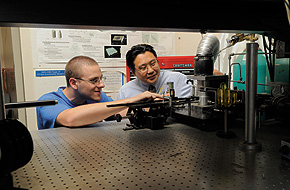Two faculty members will contribute their expertise toward separate Energy Frontier Research Centers (EFRCs) recently funded by the U.S. Department of Energy (DOE). Energy Secretary Steven Chu announced the five-year awards in April. Mechanical Engineering professors Wilson K. S. Chiu and Chih-Jen “Jackie” Sung, both of whom are associated with the newly established Center for Clean Energy Engineering (C2E2), will receive funding to support research efforts in collaboration with the University of South Carolina and Princeton University, respectively. Their efforts reflect a significant focus at UConn on the development of pioneering new, sustainable energy technologies that reduce the nation’s dependence on fossil fuels, reduce carbon emissions and integrate distributed energy technologies.
 Dr. Chiu will collaborate with multi-institutional partners, including academic and federal laboratory researchers in the EFRC for Heterogeneous Functional Materials, which received $12.5 million in funding from the U.S. Department of Energy Office of Science. The team’s efforts will be directed by former UConn Engineering professor Dr. Kenneth Reifsnider, who is now director of the Solid Oxide Fuel Cell Program at the University of South Carolina. The researchers will focus on the design and creation of materials essential for energy-related engineering devices such as fuel cells, electrolyzers, electrodes, photovoltaics, combustion devices, fuel-processing devices and functional membranes and coatings, with an emphasis on understanding the nano-structure and functionality of such materials. In approaching this challenge, the collaborators will use science to bridge the gap between multi-scale analysis and nano-synthesis methodologies to create new functional materials.
Dr. Chiu will collaborate with multi-institutional partners, including academic and federal laboratory researchers in the EFRC for Heterogeneous Functional Materials, which received $12.5 million in funding from the U.S. Department of Energy Office of Science. The team’s efforts will be directed by former UConn Engineering professor Dr. Kenneth Reifsnider, who is now director of the Solid Oxide Fuel Cell Program at the University of South Carolina. The researchers will focus on the design and creation of materials essential for energy-related engineering devices such as fuel cells, electrolyzers, electrodes, photovoltaics, combustion devices, fuel-processing devices and functional membranes and coatings, with an emphasis on understanding the nano-structure and functionality of such materials. In approaching this challenge, the collaborators will use science to bridge the gap between multi-scale analysis and nano-synthesis methodologies to create new functional materials.
The project involves multiple thrusts, and Dr. Chiu will coordinate work in the technical thrust area of analysis and simulation to provide the computational framework and numerical tools to enable revolutionary new heterogeneous functional materials. Dr. Chiu, along with other EFRC team members, will first develop the capability to couple models representing disparate length and time scales, to accurately describe the properties of heterogeneous functional materials — from the sub-atomic level up to the macro-level. They will then formulate constitutive relations and governing equations that aptly characterize the properties of these new materials. By combining these modeling and algorithmic tools, the researchers will be able to create new materials at the atomistic level that display predictable, specified functionalities. His efforts will also involve the use of nondestructive X-ray techniques to image and analyze heterogeneous functional material structures at the nano-scale. This work will be vital to the performance validation of new materials. Dr. Chiu remarked, “We are at a point in materials research where state-of-the-art computing capabilities and advanced material fabrication and characterization techniques have the potential to be used together to create new, revolutionary materials with tailored functionality at the nano-scale. I am extremely excited that we will have an opportunity to make this happen.”
 Dr. Sung, who joined the University of Connecticut in August as a School of Engineering Professor in Sustainable Energy, will contribute toward the EFRC for Combustion Science based at Princeton University under the directorship of Dr. Chung K. Law. The focus of the center, which will receive $20 million, is to develop a suite of predictive combustion modeling capabilities for understanding and optimizing the design and utilization of non-petroleum based, carbon neutral fuels in advanced engines for transportation applications.
Dr. Sung, who joined the University of Connecticut in August as a School of Engineering Professor in Sustainable Energy, will contribute toward the EFRC for Combustion Science based at Princeton University under the directorship of Dr. Chung K. Law. The focus of the center, which will receive $20 million, is to develop a suite of predictive combustion modeling capabilities for understanding and optimizing the design and utilization of non-petroleum based, carbon neutral fuels in advanced engines for transportation applications.
Dr. Sung’s efforts will focus on the creation of experimental validation platforms and databases for kinetics, thermochemistry, transport processes, and flame structure through the application of advanced extractive and in situ diagnostic methods. He explained that particular efforts will involve the development of models that accurately and comprehensively depict the reaction mechanisms of next-generation fuels (including those derived from plants and other renewable sources) — an especially challenging task further complicated by the lack of experimental data and accurate characterization of various biofuels. Another facet of the UConn work will involve the development of predictive models for high pressure, low temperature auto-ignition. He remarked that the current state of the art in this area is not particularly advanced, due to the limited number of kinetic schemes found in the literature that address the low-to-intermediate temperature combustion chemistry and the paucity of experimental data. “This task will provide new and extensive experimental data for auto-ignition over wide ranges of physical parameters relevant to practical engine applications, in terms of equivalence ratio, pressure, temperature, and dilution, for each representative component, mixtures of components, and biofuels themselves, by using a rapid compression machine. These new fundamental, high-pressure, auto-ignition data are essential for constructing and validating accurate, comprehensive, detailed kinetic mechanisms, and will help researchers understand combustion processes at elevated pressures, leading to the development of next generation of fuels and engines,” he said.



